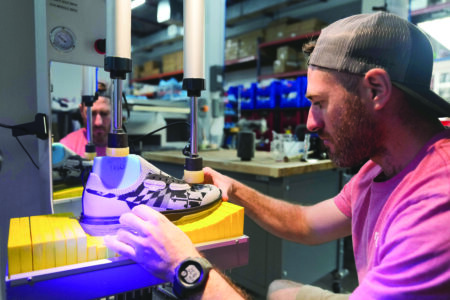Accelerating academics
NMU College of Technology and Occupational Sciences moves forward

Northern Michigan University offers an associate degree in applied science for indoor agriculture. From left are Morgan Naumann, a senior who is studying medicinal plants with an indoor agriculture minor; Alex Martinez, sophomore, indoor agriculture; and Frenchesca Chidsey, junior, indoor agriculture. (Photo courtesy of Kim Smith Kolasa)
MARQUETTE — Virtual reality and edible flowers definitely haven’t always been part of college curricula.
They are now.
Northern Michigan University faculty talked about their programs at the April 28 NMU College of Technology and Occupational Sciences Alumni Social, which was held via Zoom.
Graduates from the College of Technology and Occupational Sciences were invited to join interim Dean Steve VandenAvond and faculty members from the college for the virtual social. Alumni from the following programs were invited to join: automotive services; construction management; cosmetology; electrical line technician; heating, air conditioning, ventilation and refrigeration; hospitality management; indoor agriculture; industrial maintenance; and welding.
VandenAvond shared NMU’s new vision for the college.
“I feel like we’ve turned a corner in terms of kind of the way we do business in the college, and one of the things that we’ve done is we’ve developed an academic accelerator,” VandenAvond said.
He defined an academic accelerator as a place where people from the college can submit and work on ideas for new programs or other processes in the college to make it more efficient and innovative.
“It’s supposed to be a very transparent process where anyone can submit an idea for a program, and then anyone who’s interested in working on it can do that,” VandenAvond said.
While focusing on foundational programs, NMU wants to develop a system to help develop new programs to meet a need, he said. For instance, new certificates in plant wellness and cannabis were developed in the last six months.
Updates on various programs were provided by assistant professors Evan Lucas on construction management; Kim Smith Kolasa on indoor agriculture and Loganne Glendening on hospitality management.
Construction management
Lucas said the construction management program is working hard on implementing new ideas to stay “in touch” with the industry as much as possible, and in doing so, has started implementing a strategic plan of its own.
“We’ve been focusing heavily on specifically enrollment numbers — how do we get more students, how do we make our program a little more visible to people who haven’t previously heard of construction management or don’t know what it means in general?” he said.
Women in Construction events held in the fall and winter semesters have been a focus, Lucas said, targeting high schoolers in the fall and students in the seventh and eighth grades in the winter.
He believes the events have been a “huge help” in keeping enrollment going.
“They have a full day-long event where you get a little woodworking activity and you get welding activity, and there’s usually a 3-D modeling and/or virtual reality and augmented reality event as well, and some leadership stuff, and it’s a good way to get an educational sense of, what do we do in our industry and what kinds of things are involved and who can be there? And it’s really for everybody,” Lucas said.
Another new component of the college is an online program for a first-ever bachelor’s degree specifically for the trades — what Lucas called another “big gap” in the industry.
The need the program wants to fill, he said, is furthering the education of tradespeople who have been in a field for 20 or 30 years and want to move forward, but can’t because they need a bachelor’s degree.
Indoor agriculture
Kolasa helped create a proposal for an associate’s degree in applied science for indoor agriculture, literally and figuratively a growing field at NMU.
“We are teaching students how to grow food, different forms of food using greens, fruiting crops, herbs and edible flowers, and they work with seven different types of hydroponic systems as well as an aquaponic system,” Kolasa said. “So, essentially we’re teaching them to be professional growers so they can go out into the field.”
The program is based on consumer demand and societal needs for local food sourcing, she said, and it ties in with broader concerns such as climate change and increasing weather hazards.
It’s also an interdisciplinary program, Kolasa pointed out, so students take classes in mechanical/electrical plumbing, industrial maintenance and HVAC courses as well as baseline chemistry, biology and business.
She said a proposal has been approved to add indoor agriculture as a minor, and talks are ongoing with industry representatives to develop a bachelor’s degree.
The indoor agriculture program appears to be popular.
Kolasa said for the winter semester, the program’s course capacity was increased to 72 students, and the fall projection is 120 students.
“Indoor agriculture is proving to be one of the most sustainable ways to grow certain foods — not all foods, but certainly leafy greens,” Kolasa said. “For instance, right now most of our leafy greens are transported 1,500 miles from California, and research even shows that transit time for those leafy greens, which can be up to two weeks by the time a consumer here purchases it to eat it.”
That, she said, means a nutritional decline of up to 90%.
“At that point you’re eating fiber versus getting the nutrients from those leafy greens,” Kolasa said.
Hospitality management
Glendening said curriculum changes will be implemented in the fall.
“Our program has been with the university since the very beginning of Northern Michigan University,” she said. “In the beginning, it was all about food service and kind of has envolved since then to focus more on a larger sector of lodging and tourism.”
With the new curriculum, food service and restaurant operations will be emphasized, Glendening said.
“I could not be more excited about the adjustment,” she said.
That adjustment, Glendening noted, will hone in on this current industry — an “absolute rollercoaster” this past year because of the COVID-19 pandemic.
“It taught me a lot about what we’re really looking for when we’re looking for professionals in this industry,” she said.
The two-year associate’s degree now is titled restaurant operation, offering 75% of core lab courses within the first two years of a student’s degree and opening up hands-on training and education to allow students to jump into the industry, said Glendening, who noted the two-year degree “ladders” into the four-year degree titled hospitality management.
She acknowledged the four-year degree will have a heavier focus on the entrepreneurial side of the hospitality industry — management, leadership and human resources skills.
“We’re trying to attract individuals who have already been working in the industry,” Glendening said.
The facility
Department head John Centko said nine technology and occupational sciences programs are located in the Jacobetti Complex.
“We invite you to come and visit, take a tour and we’ll show you a little bit more,” Centko told the alumni watching the Zoom program.
VandenAvond said NMU will either break ground on a new building or renovate the existing Jacobetti Complex.
“If you come visit us a year from now, you will probably see a different outlook, either to the current Jacobetti or a new building being constructed,” he said.





